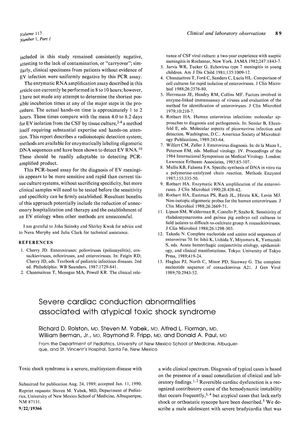Severe Cardiac Conduction Abnormalities Associated with Atypical Toxic Shock Syndrome
July 1990
in “
The Journal of Pediatrics
”

TLDR A boy with toxic shock syndrome had severe heart rhythm problems but recovered with treatment.
In 1990, a 14-year-old boy with atypical toxic shock syndrome (TSS) exhibited severe bradycardia due to complete atrioventricular block without the typical early shock or orthostatic hypotension associated with TSS. Despite echocardiographic signs of cardiac abnormalities, there were no symptoms of low cardiac output or congestive heart failure, and no need for inotropic or vasoactive medications. The cardiovascular issues, which included reversible conduction abnormalities and significant changes in cardiac automaticity, were treated with intravenous nafcillin for S. aureus sinusitis and temporary transvenous cardiac pacing. The patient recovered, regaining normal sinus rhythm and was discharged with a complete right bundle-branch block. This case was notable for being the first reported instance of TSS in a child or adult presenting with such severe cardiac conduction abnormalities.
